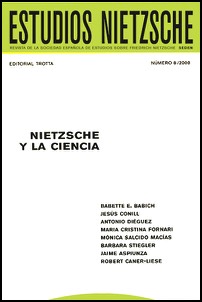The Meaning of Science and its Poeticization: A View from Nietzsche
DOI:
https://doi.org/10.24310/EstudiosNIETen.vi8.10280Keywords:
sciencie, philosophy, hermeneutic, positivism, mecanicism, poetic imaginationAbstract
Nietzsche’s approach to Science offers a hermeneutic reflection on the significance of Science from the perspective of life and its poetic powers. And his conception of the Gay Science contributes to overcoming the positivist and mechanistic view of Science.
Downloads
Metrics
References
Babette E. Babich, B. E., «The Problem of Science in Nietzsche and Heidegger», en Revista Portuguesa de Filosofia 63/1-3 (2007), 205-237
Barbera, Sandro y Giuliano Campioni, «Wissenschaft und Philosophie der Macht bei Nietzsche und Renan», en Nietzsche-Studien 13 (1984), 278-315.
Brusotti, M., Die Leidenschaft der Erkenntnis, Berlin/New York: de Gruyter, 1997.
Conill, Jesus , Ética hermenéutica. Crítica desde la facticidad, Madrid: Tecnos, 2006.
Conill, Jesus, El enigma del animal fantástico, Madrid: Tecnos, 1991.
Conill, Jesus, El poder de la mentira. Nietzsche y la política de la transvaloración, Madrid: Tecnos, 1997.
F. Kaulbach, F., «Die kopernikanishe Wendung von der Objekt-wahrheit zur Sinnwahrheit bei Kant», en V.
Gerhardt y N. Herold (Hrsg.), Wahrheit und Begründung, Königshausen & Neumann, Würzburg, 1985, pp. 99-130.
Figl, Johann, Interpretation als philosophisches Prinzip, Berlin/New York: Walter de Gruyter, 1982.
G. Abel, «Interpretationsgedanke und Wiederkunftslehre», en M. Djuric y J. Simon (Hrsg.), Zur Aktualität Nietzsches, Bd. II, Würzburg: Königshausen & Neumann, 1984, pp. 87-104.
Jean Gayon, Jean. «Nietzsche and Darwin», en J. Maienschein y M. Ruse (eds.), Biology and the Foundation of Ethics, Cambridge: Cambridge University Press, pp. 154-197.
Nietzsche, F., Obras Completas, I-IV (OC ). Director ed. Diego Sánchez Meca. Madrid: Tecnos, 2011-2016
Nietzsche, F., Correspondencia I-VI. (CO). Director ed. Luis E. de Santiago Guervós. Madrid : Trotta, 2005- 2012.
Nietzsche, F., Fragmentos Póstumos I-IV (FP). Director ed. Diego Sánchez Meca. Madrid: Tecnos, 2006-2010.
Orsucci, Andrea. «Begriffsgeschichtliche Längsschnitte: Décadence, Rasse und Züchtung und Instink bei Nietzsche», en Nietzsche-Studien 31 (2002), 397-403.
Rohde, E., U. von Wilamowitz-Möllendorff, R. Wagner, Nietzsche y la polémica sobre El nacimiento de la tragedia, edición de Luis de Santiago, Málaga: Ágora, 1994.
Salaquarda, J., «Nietzsche und Lange»: Nietzsche-Studien 7 (1978), 236-260.
Salaquarda, J., «Studien zur Zweiten Unzeitgemässen Betrachtung», en Nietzsche-Studien 13 (1984), 1-45.
Schank, Gerd, «Rasse» und «Züchtung» bei Nietzsche, Berlin/New York: W. de Gruyter, 2000.
Stingelin, M., «Nietzsche und die Biologie - Neue Quellenkritische Studien», en Nietzsche-Studien 32 (2003), 503-513.
W. Müller-Lauter, "Nietzsches Lehre vom Willen zur Macht": Nietzsche-Studien 3 (1974), p. 43.
W. Müller-Lauter, «Der Organismus als innerer Kampf. Der Einfluss von W. Roux auf F. Nietzsche», en Nietzsche-Studien 7 (1978), 189-223.
Zittel, C., «Wissenschaft», en H. Ottmann (Hrsg.), Nietzsche Handbuch, Stuttgart: Metzler, 2000, pp. 270, 289, 300, 355-356.
Downloads
Published
How to Cite
Issue
Section
License
As of issue 21 (2021) this journal is published only in open access (diamond route).
From that number 21, like the previous numbers published in NIETZSCHE STUDIES, they are subject to the Creative Commons Acknowledgment-NoComercia-ShareIgual 4.0 license, the full text of which can be consulted at <http://creativecommons.org/licenses/by-nc-sa/4.0 >
It is the responsibility of the authors to obtain the necessary permissions of the images that are subject to copyright.
This work is licensed under a Creative Commons Attribution-NonCommercial-ShareAlike 4.0 International License.
Copyright generates two different rights: moral rights and patrimonial rights that EJFB recognizes and respects. Moral rights are those relating to the recognition of the authorship. They are rights of a personal nature that are perpetual, inalienable, unseizable and imprescriptible as consequence of the indivisible union of the author and his/her work.
Patrimonial rights are those that can be derived from the reproduction, distribution, adaptation or communication of the work, among others.







11.png)
